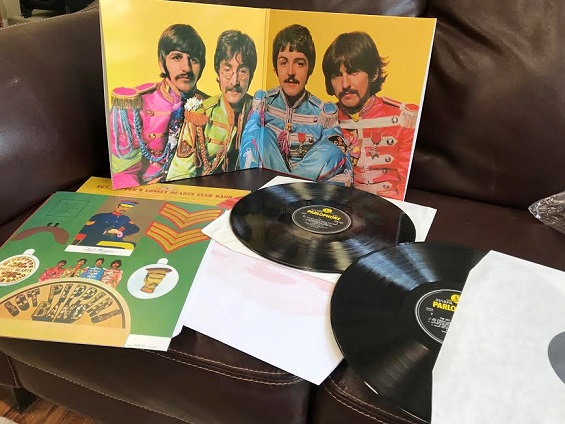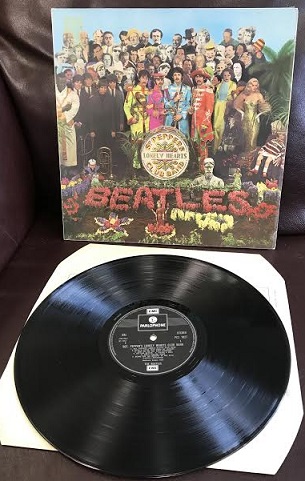The Vinyl Anachronist

by Marc Phillips
Part CV: The Sgt. Pepper Chronicles
(August 2017)
I have a strict rule about the Beatles. I don't talk about them. I avoid the subject on Internet discussion forums. If they come up in friendly conversation, I confirm that I like them and I then refrain from elaboration. I don't read endless books about them. I've owned copies of all their studio albums since I was young, but I don't feel the need to buy every single compilation of outtakes, greatest hits collection, bootleg or live album (I do own multiple copies of The White Album, but that wasn't necessarily on purpose).
The reason for this is simple. The Beatles are very special to me. I have a personal relationship with their music, something I've maintained for almost all of my life. I don't want to hear other people talking about how they feel about the Beatles. I don't care. It's like talking about your girlfriend with the guys who used to date her before you came along. I don't need anyone else coloring that very personal relationship with their irrelevant observations.
I'm about to break that rule--reluctantly.
Why? By now you've probably heard there's a new 50th Anniversary Edition pressing of Sgt. Pepper's Lonely Hearts Club Band, and everyone says it's the bee's knees. I'm not talking about the dorks on the music forums, the obsessive collectors and the remastering groupies. I'm talking about people I know, people with similar relationships to the Fab Four. While I opted out of buying the mono remixes a few years ago, despite the raves, I was intrigued enough with this particular release to pull the trigger.

Let me start off by saying that I already have a killer copy of Sgt. Pepper. It's a UK Parlophone pressing that I received on my fifteenth birthday, a present from my best friend who was head-over-heels in love with the band and was trying to get me to share the same enthusiasm so we could geek out together (it worked). This pressing has always been one of the jewels in my LP collection. It might be the oldest LP in it--most of the albums before that were probably traded away as my musical tastes changed. (I'm talking about the Great Purge of '81, when I went all "New Wave"). Sure, I regret the fact that I didn't keep every single LP I've ever owned, but that's life.
Another miraculous thing about this LP is that after hundreds of plays on all sorts of record players, it's still in almost perfect shape. I'm not sure why. Maybe it's a magical album. I hear almost no pops, clicks or any other type of surface noise--even after almost 40 years. I once owned the US Capitol version of Sgt. Pepper and it just didn't compare. I remember hearing all sorts of noise. It might have been warped a little. It was given to someone less fortunate than me a long time ago.
This version also has fantastic sound quality, especially when compared to some of the other Beatles records I own. You don't hear it so much on the opening title track, which was meant to sound a little grungy, but when Ringo starts singing "With a Little Help From My Friends," my heart starts racing and I get goosebumps. Paul's bass guitar is so clear and present--all of my earlier Beatles albums always sounded a tad bass-shy. It was almost like hearing Paul's bass for the first time.
My other reservation about the earlier albums concerns the stereo mix--so often they put the entire band in one channel and the singer in the other, which always sounded awful. That's why so many Beatles fans prefer the mono versions of the older albums--they sound more whole and less disjointed (the story behind that is the Beatles were always present in the studio for the mono mixes, but George Martin would handle the stereo mixes on his own because most of their fans back in the ‘60's listened on small record player, not fancy hi-fi systems). Sgt. Pepper is the first Beatles album that sounds like an almost modern recording, with plenty of imaging and soundstage depth.
In fact, I often play this album when I have fellow audiophiles over. Their first reaction is 'oh, you're playing this.' Okay, if you say so. The second reaction is wow, I've never heard it sound this good. This is why I wanted to buy the 50th anniversary version. Could it possibly be better? Let's find out!
First, let's do the numbers:
32,000,000. That's the number of copies that have been sold worldwide through 2011.
25,000: The production cost, in pounds.
40: Number of seconds for the length of the final piano chord for "A Day in the Life."
27: Number of weeks it spent at #1 in the UK sales charts.
15: Number of weeks it spent at #1 in the US sales charts.
1: The album's position on Rolling Stone's 500 Greatest Albums of All Time.
Here's one more number: $32.99. That's how much I paid for the 50th Anniversary Edition reissue at the local record store here in Syracuse. Now I'm not saying that's an exorbitant sum by any means. This is the price for the 2-LP set which contains the original album and a second disc full of alternate takes, plus all the little extras like the cardboard cutouts and even a legend for all the famous people on the front cover. This deluxe version has been pressed on gorgeous 180 gram vinyl, which is just as quiet as my original copy. I routinely pay $30-50 or more on audiophile pressings without a second thought. The super-duper box set with CD's, DVD's and more costs about $135, so that $32.99 is really quite reasonable.
There are two small reasons why I was so reluctant to spend $33, however. First, I can only imagine what my friend spent on my original copy back in 1977. Five bucks? Six? And this was a UK Parlophone pressing. Second, I actually went to the record store here in Syracuse the day it was released, and they had it priced at $19.99. There were several copies, so I thought I'd come back later in the week and pick it up. When I went back, they were all gone. When they finally reappeared, the price was $32.99. Arrggh.
I originally planned to listen to my original copy first for comparison, but I was too eager to hear the new one. My first impression was of a far more meaty and up-front presentation, with deeper bass. That astonishing transition from the first track into the second track was still thrilling, but not as breathtaking as the older LP. I'm not sure why, but it seemed less airy and clear. I listened to the rest of the album, and I didn't notice any startling revelations or new insights--it was merely a great pressing of an incredibly familiar album.
Then it was time to break out the old album for some A/B comparisons, the moment of truth.
The most striking difference between the old and the new versions is the actual mix. In the older mix, there are still lopsided moments where the scales are tipped too much in one channel or another--this is especially evident in the opening track. In the new version, the performers are spread more evenly from left to right, with plenty of space between them. Next, I noticed a huge difference in the low frequency response between the two LPs. The 50th Anniversary Edition had bass that was much deeper, tighter and warmer. If you're a fan of Paul's bass or Ringo's kick drum, this is very good news.
That moment when Ringo starts singing on "With a Little Help from My Friends" was sort of a toss-up. The older version seemed a little crisper and presented more of a contrast from what came before. The newer version doesn't induce as many goosebumps, but it does sound more natural and honest.
As I moved through the rest of the songs on both albums, the news grew steadily worse for my old friend. The new version simply sounded more modern, as if it was recorded far closer to 2017 than 1967. The old version preserves that historic window into the original performance, something I've found desirable over the years, but the new version simply removes most of those veils and lays out a far more convincing musical presentation.

I could go song by song, but I won't. I will say that there's an added surprise at the end, one I've been waiting to discover for many years. This involves the famous final piano chord that lasts for slightly more than 40 seconds. That decay was captured so beautifully because the sensitivity of the microphones was gradually turned up as the sound level of the chord lessens. As a result, you start to hear movement in the room toward the end--paper rustling, and of course the famous creaking chair. In the older version, you can hear these artifacts as just random noises, but on the newer version you hear them more clearly, and you can tell exactly what they are.
The second LP on the 50th Anniversary Edition is fun, of course, but it's not something I'm going to listen to repeatedly. It consists of alternate takes of each song, repeated in the same order as the actual album. Some of these takes are interrupted and scrapped, some are instrumental tracks and others are just completely different takes. In each case it's obvious why the final version was selected--it's like watching deleted scenes from a DVD. Let's try one more, boys... this time with more feeling.
So why is this version such an obvious improvement over the original? Giles Martin, the son of George Martin, went back to the first generation tapes for a sound that's bigger, cleaner and warmer. The original stereo version had been mixed-down several times by Dad, which wasn't necessarily a bad thing considering how innovative the recording process was. Sgt. Pepper is an ornate album, and it took a long time to get it right. Fortunately, remastering engineers have since learned that less is more, and that the truth is always hiding in the original master tape.
I've entered into a conundrum, however. I'm not talking about which version I now prefer--it's obvious that the new one wins by a substantial margin. I can retire my old Parlophone and let it get more and more valuable. No, I'm talking about that old elusive mono UK Parlophone version I always wanted, the one that's really worth money. I've never been able to find a decent copy for a reasonable amount of money--it's a bit of a "unicorn" for collectors. Yet I still wonder how this new version would compare to an original mono UK Parlophone in mint condition, preferably from the first pressings. So many people have told me that the original mono mix is like hearing it for the first time--it's very different. I've never heard it, and I'm not sure the mono reissues that came out a couple of years ago would suffice. Should I track a copy down and splurge?
Maybe not, and for one reason. Sgt. Pepper's Lonely Hearts Club Band isn't my favorite Beatles album. Far from it, in fact. So I'm not going to become OCD about finding the ultimate version. I have two meaningful copies, and I'm fine with that.
My favorite Beatles album, however, is The Beatles, aka The White Album. It will be 50 years old next year. Are they planning something similar, or is it just that the entire world has always had a very personal relationship with Sgt. Pepper and this is a one-time pleasure? I can't wait to find out.